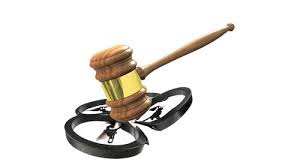
I recently was
asked if there are guidelines/ licenses for operating drones for commercial
purposes in Nigeria, If yes, what are they and the requirements needed to
obtain a such license?
asked if there are guidelines/ licenses for operating drones for commercial
purposes in Nigeria, If yes, what are they and the requirements needed to
obtain a such license?
The Nigerian
Civil Aviation Authority (NCAA) issued a statement prohibiting the launch of
remotely piloted aircraft (known as ‘drones’) in the Nigerian airspace without
a permit from the NCAA and the Office of National Security Adviser (ONSA). The
NCAA stated that the move was part of the safety guidelines issued by the regulatory
agency to drone operators.
Civil Aviation Authority (NCAA) issued a statement prohibiting the launch of
remotely piloted aircraft (known as ‘drones’) in the Nigerian airspace without
a permit from the NCAA and the Office of National Security Adviser (ONSA). The
NCAA stated that the move was part of the safety guidelines issued by the regulatory
agency to drone operators.
NCAA
guidelines and requirements
guidelines and requirements
To qualify for
the issuance of certificate, applicants are expected to undergo five phases.
These are as follows, Pre-Application, Formal Application, Document Evaluation,
Demonstration & Inspection and Certification phases.
the issuance of certificate, applicants are expected to undergo five phases.
These are as follows, Pre-Application, Formal Application, Document Evaluation,
Demonstration & Inspection and Certification phases.
An application
for grant of a permit for aerial aviation services (PAAS) must be made in
writing to the director general of the NCAA. The application should be signed
by a person duly authorised by the applicant and submitted on or before a date
no less than six months before the expected date of use of the PAAS.
for grant of a permit for aerial aviation services (PAAS) must be made in
writing to the director general of the NCAA. The application should be signed
by a person duly authorised by the applicant and submitted on or before a date
no less than six months before the expected date of use of the PAAS.
Required
Information:
Information:
The application
for the grant of a PAAS must contain the following particulars:
for the grant of a PAAS must contain the following particulars:
1.
name and address of the applicant;
name and address of the applicant;
2.
type of air services to be provided;
type of air services to be provided;
3.
proposed operational base of the applicant;
proposed operational base of the applicant;
4.
details of proposed routes to be operated, where
applicable;
details of proposed routes to be operated, where
applicable;
5.
the number and types of proposed aircraft to be
used; and the time and frequency of the services.
the number and types of proposed aircraft to be
used; and the time and frequency of the services.
6.
The following supporting documents are required for
processing the application:
The following supporting documents are required for
processing the application:
a.
four copies of the certified true copy of the
company’s certificate of incorporation;
four copies of the certified true copy of the
company’s certificate of incorporation;
b.
four copies of the certified true copy of
four copies of the certified true copy of
–
the memorandum and articles of association;
the memorandum and articles of association;
–
the particulars of the directors of the company
(Form CAC 7); and
the particulars of the directors of the company
(Form CAC 7); and
–
the statement of share capital/return of allotment
(Form CAC 2) with minimum paid-up share capital of N20 million; at least one
member of the board of directors must be an aviation professional and the
majority shareholding must be held by Nigerian(s);
the statement of share capital/return of allotment
(Form CAC 2) with minimum paid-up share capital of N20 million; at least one
member of the board of directors must be an aviation professional and the
majority shareholding must be held by Nigerian(s);
c.
four copies of the current tax clearance
certificates of the company and each director (the originals should also be
submitted for sighting);
four copies of the current tax clearance
certificates of the company and each director (the originals should also be
submitted for sighting);
d.
four copies of a detailed business plan of the
operation indicating, among other things:
four copies of a detailed business plan of the
operation indicating, among other things:
e.
the company’s vision, mission, market analysis and
strategy; and
the company’s vision, mission, market analysis and
strategy; and
f.
the company’s ownership structure, personnel plan,
fleet acquisition plan, financial plan including source of finance, balance sheet,
break-even analysis, pro forma income projections (profit and
loss statements), cash flow analysis and charter rates for passengers or cargo;
and
the company’s ownership structure, personnel plan,
fleet acquisition plan, financial plan including source of finance, balance sheet,
break-even analysis, pro forma income projections (profit and
loss statements), cash flow analysis and charter rates for passengers or cargo;
and
g.
other standard business plan requirements showing
detailed roadmap of how the applicant intends to provide efficient services;
other standard business plan requirements showing
detailed roadmap of how the applicant intends to provide efficient services;
h.
evidence of the applicant’s solvency to undertake
the business;
evidence of the applicant’s solvency to undertake
the business;
i.
duly completed application forms;
duly completed application forms;
j.
duly completed personal history statement (PHS)
forms and two passport photographs for each shareholder of the company with
more than a 5% equity shareholding (the PHS forms are to be completed at the ONSA
headquarters in Abuja); and
duly completed personal history statement (PHS)
forms and two passport photographs for each shareholder of the company with
more than a 5% equity shareholding (the PHS forms are to be completed at the ONSA
headquarters in Abuja); and
k.
a N500,000 non-refundable processing fee.
a N500,000 non-refundable processing fee.
Please bear in
mind that on receipt of the application, the NCAA may request additional
information from the applicant as necessary. The outcome of the technical
evaluation of the application, accompanied by an appropriate recommendation,
will be forwarded to the Air Transport Licensing Committee for consideration
and approval of issuance of a licence or otherwise as soon as the security
clearance or comment has been received from the ministry. The NCAA will refuse
to grant a licence if the applicant is not cleared by the State Security
Services’ Office. Licences not used when their three-year validity period
expires will not be renewed.
mind that on receipt of the application, the NCAA may request additional
information from the applicant as necessary. The outcome of the technical
evaluation of the application, accompanied by an appropriate recommendation,
will be forwarded to the Air Transport Licensing Committee for consideration
and approval of issuance of a licence or otherwise as soon as the security
clearance or comment has been received from the ministry. The NCAA will refuse
to grant a licence if the applicant is not cleared by the State Security
Services’ Office. Licences not used when their three-year validity period
expires will not be renewed.
A PAAS is valid
for three years. Upon receipt of a PAAS, an annual use fee of N100,000 must be
paid to the NCAA.
for three years. Upon receipt of a PAAS, an annual use fee of N100,000 must be
paid to the NCAA.
Oando Reservoir
and Production Services Ltd. received the certificate having satisfied the
requirements and found competent to secure the safe operation of the Aircraft
type Lockheed Martins SN 248-255. The certificate is for flights with the
purpose of aerial work specifically Environmental Observation Monitoring and
Protection.
and Production Services Ltd. received the certificate having satisfied the
requirements and found competent to secure the safe operation of the Aircraft
type Lockheed Martins SN 248-255. The certificate is for flights with the
purpose of aerial work specifically Environmental Observation Monitoring and
Protection.
In researching, I
observed from the NCAA website that there is no distinction in
guidelines between commercial use and recreational use . Possibly these guidelines
apply to recreational use of drones in Nigeria; however I have seen movie
producers and photographers make use of this equipment and I doubt that they
have gone through this rigorous hurdle to obtain a license.
observed from the NCAA website that there is no distinction in
guidelines between commercial use and recreational use . Possibly these guidelines
apply to recreational use of drones in Nigeria; however I have seen movie
producers and photographers make use of this equipment and I doubt that they
have gone through this rigorous hurdle to obtain a license.
DISCLAIMER:
Recourse should be made to the writer or the NCAA for further clarification
or information on the matter.
Recourse should be made to the writer or the NCAA for further clarification
or information on the matter.

Toju Dottie
Senior Associate
& Consultant
& Consultant
George Ikoli &
Okagbue
Okagbue
Source : Linkedin
Photo credit – www.dronelife.com
